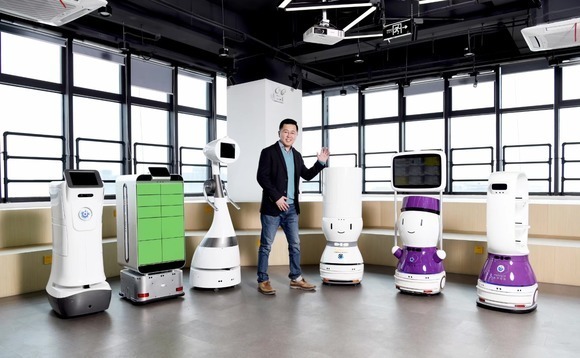
Deal focus: Vision Fund bets on service robots

COVID-19 crippled demand for restaurant service robots, so China’s Keenon Robotics pivoted towards hospitals. It has $200 million in Series D funding to target new application scenarios
Some investors still question the real value of service robots. SoftBank clearly isn't among them, with Vision Fund 2 leading a $200 million Series D round for China's Keenon Robotics. It is billed as the largest-ever funding round in the space.
Keenon is 11 years old, but it really gained momentum in the wake of COVID-19. "It feels like a dam has suddenly burst its dike, with a bang, and a huge amount of water has spewed out. No obstacle could stand in the way," says Tong Li (pictured), the company's founder. "The application scenarios for service robots are enormous, and the new capital will help us move faster and provide larger-scale services."
Based on current growth rates, he expects robots to be everywhere within five years. It will be akin to a scene from science fiction: robots shipped from factories all over the world, night by night.
Keenon initially focused on robots that work in restaurants, transporting dishes to tables. When the pandemic arrived, restaurants closed, and revenue suffered. But the company quickly develop a new model for hospital sterilization. Its robots are also used to deliver medical supplies and meals in hospitals. New customers flooded in.
Before COVID-19, when a Keenon video post exceeded 1,000 views on Douyin, it was hailed as a triumph, Li notes. Since then, one video post has attracted 60 million views.
"The pandemic has created an opportunity for customer education and boosting industry awareness. Our customers previously did not know what a robot was, and it took a long time to explain. After the pandemic, the interaction completely changed," he adds.
Total shipments to date exceed 20,000. As of March 2020, Keenon had more than 1,000 corporate customers in 400 cities, including 65% of the country's 100 largest restaurant chains. Revenue came to nearly RMB100 million ($60 million) in 2019, an 8x increase on the previous year. Leasing is the key driver. It costs around RMB3,000 per month to rent a robot and contracts run for two years.
The company did not provide updated figures on announcing the Series D.
For the next step in its expansion, Keenon will enter lower-tier cities in China, even small towns and counties. In addition, it plans to develop robots for a wider range of scenarios. Li jokes that the company is in facto human resources outsourcing business that specializes in running errands.
"We continue to penetrate restaurants and hotels, healthcare, and cleaning, but we want to solve labor problems across various scenarios. Even within the restaurant space, there are many different types of establishment – one robot model cannot satisfy all needs," he says. Keenon's latest model, known as Feiyu, is small and moves fast. It is designed for restaurants with limited space.
Much has been made of the potential competitive threat Keenon faces from autonomous driving companies. Li doesn't dispute there are similarities on a basic level, such as in positioning and navigation, but he isn't losing any sleep over it.
"Both are about knowing where you are, where you are going, and how you are going there," he notes. "But the scenarios are different, the algorithms, data, supply chain, end-customer demand, and sales channels are all different."
Robots belong to a very long value chain of which algorithms are just one part. Some aspects of it have more in common with traditional automotive manufacturing than autonomous driving. Moreover, the two industries are at different stages of development: service robots have entered the large-scale commercialization phase, while autonomous driving is still doing R&D and tests.
Even with increased competition, there is still plenty of business to go around. The Chinese Institute of Electronics estimates the country's service robot market will be worth $8 billion by 2023, accounting for a 30% global share. Several Series D investors could support international expansion, notably Saudi Aramco-controlled Prosperity7 Ventures, which can open doors in Saudi Arabia.
Saudi Aramco is pursuing the broader national objective of diversifying beyond oil, with technology being one of the priorities, Li adds.
Latest News
Asian GPs slow implementation of ESG policies - survey
Asia-based private equity firms are assigning more dedicated resources to environment, social, and governance (ESG) programmes, but policy changes have slowed in the past 12 months, in part due to concerns raised internally and by LPs, according to a...
Singapore fintech start-up LXA gets $10m seed round
New Enterprise Associates (NEA) has led a USD 10m seed round for Singapore’s LXA, a financial technology start-up launched by a former Asia senior executive at The Blackstone Group.
India's InCred announces $60m round, claims unicorn status
Indian non-bank lender InCred Financial Services said it has received INR 5bn (USD 60m) at a valuation of at least USD 1bn from unnamed investors including “a global private equity fund.”
Insight leads $50m round for Australia's Roller
Insight Partners has led a USD 50m round for Australia’s Roller, a venue management software provider specializing in family fun parks.








